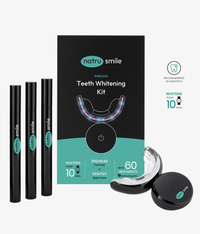
All products are certified by dental expert Dr. Greg Grillo
An HSA is a great way to save money while ensuring you can cover any surprise medical expenses, but what else can it cover?
There’s currently over $100 billion put away in health savings accounts across the country, meaning that a lot of people are utilizing this tax-advantaged savings vehicle.
So what exactly is an HSA, and can you put it to use to get that billion-dollar smile of your dreams?
What is HSA? An Overview
A Heath Savings Account (HSA) is a specialized savings account where untaxed dollars can be stored to earn interest until they are used to pay healthcare-related costs. It is often used to help pay for medically necessary services.
This money can cover:
- Co-insurance
- Deductibles
- Co-payments
- Dental care
- Vision care
While it can not be used to pay insurance premiums, an HSA can be an invaluable tool when it comes to managing healthcare costs. It’s designed for people with High Deductible Health Plans (HDHPs) to cover their deductible should the need arise.
Every year there’s a specific amount of money that you can deposit into your HSA. These funds will carry over and may collect interest. Over time, individuals and families can amass quite a bit of saving, perfect for health-related emergencies.
Can You Use HSA For Teeth Whitening Services?
Unfortunately, you can not use money from your HSA to cover teeth whitening services. While there are many benefits to white teeth, it is ultimately considered a cosmetic procedure. Any service designed to improve a patient’s appearance as opposed to their bodily functions is not an eligible expense.
While there are times when teeth whitening isn’t simply cosmetic, the IRS still expressly excludes both in-office whitening treatments and at-home teeth whitening. An alternative treatment for fluoride and tetracycline stains is veneers.
They are covered by an HSA but are also quite a bit more expensive.
Other Types Of Services That You Can Cover By Using HSA
While there may not be any HSA-approved teeth whitening services, there are several other dental care procedures that are covered.
Implants
An HSA is a great way to get medical procedures that are not covered by your insurance. For example, if you find you need a dental implant, you can use funds from your HSA to cover the cost.
A dental implant replaces a tooth from the very root. They can be used to improve speech, appearance, oral health, and durability.
Because they last for your entire life and require a lot of skill, these implants can be very costly. The funds from your HSA can make the price a lot more manageable.
Veneers
Veneers straddle the line between cosmetic and necessary dentistry. To get a dental veneer covered by your HSA, you will need to have a clear and documented case for why it is required medically.
Some reasons that a veneer would be covered include:
- Fluoride staining
- Tetracycline staining
- Broken or chipped tooth
- Challenges due to acid reflux, celiac disease, or enamel hypoplasia
Check with your plan administrator about the veneer before moving forward to make sure it will be eligible.
Cosmetic Dentistry
While veneers land in a gray area for eligibility, cosmetic dentistry is a hard bargain. Generally speaking, you won’t be able to use HSA funds for these procedures. However, if dentistry would impact the proper function of your teeth, you likely have a case.
For example, a chipped tooth can affect your ability to eat or talk. It can also lead to more issues down the road, depending on their severity. While a chipped tooth is technically cosmetic, with proper documentation, it can be medically necessary enough to be covered with your HSA.
Bonding
Dental bonding is a great way to restore teeth that have been damaged or decayed. It also helps with cracked, chipped, and discolored teeth. The procedure involves applying a composite resin material to the tooth and hardening it with a special light.
Bonding can be expensive if you’re not covered by insurance, but your HSA funds can help cover the costs. Because it combats decay, it is considered medically necessary and eligible for HSA funds.
Crowns
Crowns are often a necessary dental procedure, usually to cover up decaying or damaged teeth. They help protect and restore weakened teeth, improve the cosmetic appearance of discolored teeth, reduce pain from exposed nerves, and prevent further damage.
If your dentist has recommended you get one or more crowns for medical reasons, then it is likely that your HSA can cover the cost.
Dentures
Dentures are the most common form of dental prosthesis. They can be used to replace a full set of teeth or just one specific tooth.
Since they require maintenance and replacement every few years, having access to an HSA can help with the associated cost. Dentures solve problems with speech, mastication, and aesthetics, making them fully eligible.
Extractions
Sometimes, it is necessary to have a tooth extracted. Maybe you have a wisdom tooth that needs to be taken out or an infection that requires the removal of a tooth.
Whatever the reason is, you can use your HSA funds to cover the cost of extraction surgery and any follow-up treatments required afterward.
Fillings
Fillings can be used to replace teeth that have been damaged or broken. They are often the first line of defense against cavities and tooth decay, so they’re great for preventative dentistry.
Your HSA can be used to pay for these fillings as long as there is documented medical need.
Root Canals
The immense pain and dental disease that leads to a root canal being required make it an eligible expense. If you are having a root canal done, there is no doubt that it will be covered by your HSA.
While root canals have a reputation for being extremely painful, recent studies show that they are no worse than any other dental procedure. If your dentist recommends one, you can rest assured that it will be safe and as comfortable as dental work can be.
The procedure itself can be very expensive, but with the funds from an HSA, you can rest assured knowing that the cost of treatment is taken care of. If you don't currently have the full amount in your HSA, you can keep the receipts and reimburse yourself with further contributions.
Dental Cleaning
While teeth whitening isn't eligible, a dental cleaning is necessary to keep your oral health in check. While it can be covered by insurance, you may find that the HSA funds cover the extra costs associated with certain procedures such as deep cleaning, periodontal scaling (for gum disease), or fluoride treatments.
It’s important to remember that these are preventative measures and should not be used to replace regular visits to the dentist for exams and x-rays.
Using HSA For Orthodontic Braces
You might think that braces are a purely cosmetic procedure, but they have a plethora of health benefits including:
- Preventing dental injuries
- Improving speech
- Preventing tooth decay
- Preventing bone erosion
- Improving your bite
Braces for both adults and children are completely eligible for HSA usage.
However, as many experts are recommending that your HSA operate as an emergency fund, this might not be the best choice.
No matter who your braces are for, it’s likely that you have ample warning before they’re necessary. This gives you time to look into other options like investing in insurance that covers orthodontic procedures or an account that is more immediate, like a Flexible Spending Account (FSA).
Using HSA For Emergency Dental Work
On the other hand, you never have time to prepare for a dental emergency. For instance, if you have a root canal or wisdom teeth removal. These procedures often come up suddenly and require quick action to prevent further damage.
Your HSA is the perfect option for these types of emergency dental work as it can be used immediately and without tax penalty. You won’t have to worry about your insurance coverage or whether you’re eligible for an FSA at that moment—you can just draw from your HSA funds right away.
When you use your HSA money, it will be connected with a High Deductible Health Plan. This means you will need to pay for the majority of the procedure.
Make sure you look at all your options, and if a different insurance plan works better for you in the long run, it might be helpful to keep more money in your HSA.
It starts to get a little confusing what is and isn’t eligible for HSA, especially when it comes to your dentistry. Here are a few frequently asked questions that should help clear up any loose ends.
What Dental Services Are Not Covered By My HSA?
Any dental procedures that are not medically necessary will not be covered by your HSA. This includes teeth whitening kits, basic supplies like toothbrushes and mouthwash, and any purely cosmetic services.
An exception to this is an electric toothbrush or Waterpik. With a letter from your dentist claiming these items as medical necessities, you can use money from your HSA to get them.
Why Should You Use HSA For Dental Services?
There are several benefits to using an HSA for dental and other health services.
Because you don’t pay taxes on funds going into the account or coming out, funneling money into your HSA can lower your taxable income for the year.
Money from your HSA can be used to cover treatments that aren’t covered by your dental insurance provider and helps you to cover deductibles for things that are. It’s a great way to take control of where your money goes, even if you change insurance companies.
How Much Is HSA Eligible Limited Expense For Teeth Whitening?
Because teeth whitening is considered a cosmetic procedure, it is not considered an HSA-eligible expense. If you take out money to cover teeth whitening, you will have to pay taxes and a penalty.
If you want to handle stains caused by fluoride or tetracycline, an option that is covered by HSA is a veneer. This procedure is more expensive, but you can use your HSA funds.
How Does A Health Savings Account Save You Money?
Contributions to your HSA do not get taxed at any point. Keeping money in this account in case of an emergency allows you to hold onto money without paying tax on it, and it can gain interest over time.
When you use HSA funds on medical and dental expenses, you’re able to cover your deductible tax-free as well.
The Bottom Line
An HSA is a great way to save money for a rainy day, and it can be used to cover many dental procedures. From veneer to fillings to electric toothbrushes, it can help you stay on top of your oral health.
The benefits of an HSA are clear, and the savings it provides are invaluable. Even though you can't get your teeth whitened with these funds, they can get you a long way.
Put simply, if you're looking for a way to enjoy quality dental care without breaking the bank, consider investing in a Health Savings Account today!









